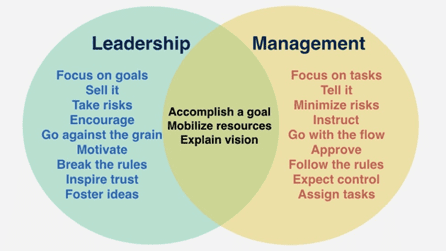Management vs. Leadership – Understanding the Difference

A manager and a leader are two roles that are often confused. The words are used interchangeably and a lot of the time, the true meaning behind these two words are misinterpreted. So here are some of how you can tell the difference between a manager and a leader and the kind of roles and duties that each of these terms is actually linked with so that you are clear on the never-ending debate between management vs. leadership.

Who is a Manager?
A manager, essentially, is a member of an organisation who has the responsibility of carrying out all of the important functions of management that include planning, organising, controlling, and leading. However, the real question is; are all managers actually leaders?
More of a Job Than an Investment
There is no straightforward answer to that question because most managers tend to also be leaders, but if only they can also fulfil the leadership responsibilities such as team motivation, effective communication, guidance, inspiration, and encouraging higher productivity in employees.

(Source: https://stevekeating.me/tag/leading-vs-managing/ )
This is where management vs. leadership comes in. Some managers are great at managing but have very poor leadership skills and people follow them simply because they are obligated to do so and not because they are inspired to do so. Managerial duties are also a formal part of the job description and they will perform these tasks and duties as a part of their role.
What Do Leaders Do Then?
The main difference between managers and leaders is that a leader will not necessarily hold a management position. In other words, leaders are not always authority figures in a company, it can actually be the colleague sat next to you, it could be anybody in your organisation. In other words, the power of a leader comes from his or her followers and not necessarily from the organisation.

(Source: https://www.jobberman.com/blog/leader-vs-manager/ )
They are Followed Out of Choice
Another point to know is that leaders are followed by choice and not out of obligation. One of the main reasons for this would be their charismatic personality, along with their beliefs, behaviour, and other such traits. A leader will be personally invested in projects and tasks and will demonstrate a very high level of passion for whatever work that they do. They will be invested in the success of their team and followers and will enable them to achieve their goals. These goals may not always be business goals – they could be even personal growth goals.
They Motivate Others
Followers will also find that following a leader is not obligatory. If you feel inspired, motivated and genuinely believe in what they offer you can choose to follow a leader. If not you could simply have nothing to do with them. In general, leaders would love to challenge and change the status quo. They are visionary, agile, and creative. They are also adaptive and very progressive and open-minded.

(Source: http://www.yourcareerintel.com/be-a-leader/top-three-traits-leaders-possess/ )
Now that you have an idea of what differences come into the management vs. leadership debate, you could probably begin to look within yourself to find out if you are a manager or a leader. Either way, having any of these skills will be an asset for your future. Did this blog help you? Leave us a comment and let us know. You can also contact us at [email protected] for our programs on management and leadership skills.

0 responses on "Management vs. Leadership - Understanding the Difference"